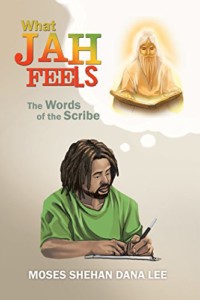Title: What Jah Feels: The Words of the Scribe
Author: Shehan Dana Lee
Publisher: Xlibris
ISBN: 9781543431384
Genre: Poetry
Pages: 266
Reviewed by: Susan Milam
Pacific Book Review
What Jah Feels: The Words of the Scribe, by Moses Shehan Dana Lee, speaks to the reader on multiple levels. The book can be read for the enjoyment of its free verse poetry. The volume can be appreciated for the love story that is threaded throughout its chapters. On its deepest level, What Jah Feels can be viewed as the story of a supplicant searching for answers and a stronger relationship with his creator, Yahweh.
The narrator of What Jah Feels takes the reader on a journey of discovery. The author, or scribe, seeks understanding of the lessons Yahweh has to offer. In addition, the writer revels in the profound love and respect he has for his partner. Throughout the book, the scribe praises Yahweh and thanks the creator for the blessings which he has made manifest in the writer’s life. Still, the scribe isn’t afraid to discuss the struggles he faces when trying to discern Yahweh’s lessons; and he doesn’t shy away from talking about moments of anger and bewilderment. The author’s willingness to delve deeply into all of his emotions makes the book more authentic and powerful than if he portrayed the path to enlightenment as an easy road. In poem 215, “Face-to-face pottery and clay,” the scribe says that “every vessel must be broken” and then a “blank slate makes new.”
Many of the precepts discussed come from the viewpoint of a Rasta, a follower of the religious and social movement known as Rastafarianism. In poem 175, “A Rasta seeketh new ways,” the scribe talks of seeing knowledge through “a Rasta mind’s eye” and in poem 178 “Rasta enlightenment,” he talks about the ability of “even the Simple Rasta” to partake of wisdom. However, the reader need not be a Rasta to draw meaning from the verses.
The writer uses strong imagery to develop the book’s themes. In the verses dealing with the passion he feels for his partner, the poetry is reminiscent of “The Song of Solomon” in the Holy Bible. Many of the stanzas use animals as metaphors for the relationship between a man and a woman, or between the creator and the created. The images evoke mental pictures which help the reader understand the fervor of the scribe’s feelings.
What Jah Feels stands on its own as a book of beautiful poetry, and it can be enjoyed for that reason alone. However, it can also be explored as a guide to seeking a more meaningful relationship with one’s creator. Although the vocabulary comes from a Rasta mindset, the concepts discussed are universal. The ideas can be used as stepping off points for studying other religious and philosophical texts and as meditative guidelines. Inquisitive readers looking to expand their horizons will want to take a deep dive into What Jah Feels.


